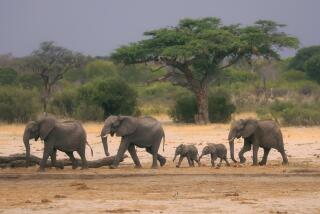Peru: It’s official, Manu National Park is tops in biodiversity
- Share via
Manu National Park in southeastern Peru recently claimed the record as the most biodiverse place on the planet for reptiles and amphibians. It beat out Yasuni National Park in neary Ecuador for having the most species, some of them newly discovered, at the 7,000-square-mile park, according to media reports.
By the numbers, Manu has 155 amphibian and 132 reptile species besides 1,000 species of birds and 1,200 species of butterflies. We’re talking snakes, frogs (some poisonous), toads, lizards, caimans and more, the California Academy of Sciences reports.
“For reptiles and amphibians, Manu and its buffer zone now stand out as the most diverse protected area anywhere,” said Rudolf von May, a Peruvian researcher at UC Berkeley’s Museum of Vertebrate Zoology who has spent more than 15 years searching for and sorting out Manu’s abundant creatures.
The park is about two hours from Cuzco, the popular stepping-off point for tourists heading to ancient Inca site Machu Picchu. It contains all kinds of habitats -- Amazon rain forests, high-altitude cloud forests, and Andean grasslands -- that have been recognized as a Conservation International Biodiversity Hotspot and a UNESCO World Heritage Site.
Follow us on Twitter @latimestravel, like us on Facebook @Los Angeles Times Travel.
More to Read
Sign up for The Wild
We’ll help you find the best places to hike, bike and run, as well as the perfect silent spots for meditation and yoga.
You may occasionally receive promotional content from the Los Angeles Times.







